No doubt, CBD alters the way the body processes some medications. For this reason, some drugs shouldn’t be taken with CBD.
What Is CBD?
CBD is the short term for cannabidiol. Cannabidiol is a chemical compound found in the Cannabis sativa plant, which we commonly call hemp or marijuana. It is one of the many chemicals called cannabinoids found in the cannabis plant.
CBD occurs naturally in the cannabis sativa plant and has gained massive attention for its potential use in easing symptoms of anxiety, insomnia, chronic pain and several other health problems.
CBD is now being infused into edibles and products like oils as it is touted for its ability to induce a state of relaxation and calmness. However, unlike tetrahydrocannabinol simply called THC, which is another chemical (cannabinoid) found in the sativa, CBD is not classified as a psychoactive substance. It doesn’t create a feeling of high.
How Does CBD Affect Other Drugs?
In order to know how CBD can interact with certain medications adversely, it is vital to understand how the body metabolizes these substances. Metabolism is the chemical process that the body goes through in a bid to break down and utilize the substances you ingest; this includes food as well as drugs.
Metabolism could be the build-up of substances (anabolism) or the breakdown of substances (catabolism). Note that enzymes are involved in metabolism and one of the important enzymes involved in the metabolism of most clinically prescribed drugs is the CYP3A4 enzyme.
Some of the drugs which the CYP3A4 enzyme breaks down include staple medications like acetaminophen, diazepam (valium), codeine and erythromycin. CYP3A4 is found in the liver, where it interacts with medications passing via the bloodstream. Coincidentally, the CYP3A4 enzyme is also responsible for metabolizing cannabinoids like CBD. However, studies have shown that CBD inhibits the production of CYPA4.
This means that as you take in CBD, your body produces less of the CYP3A4 enzyme, thus affecting the metabolism of these drugs. The result is that drugs might not be metabolized as fast as they ought to; they linger for a longer duration in the bloodstream and fail to deliver the full expected result.
CBD And Potential Drug Interactions
We can’t talk about CBD and its potential drug interaction property without talking about the “grapefruit warning.”What is the grapefruit warning all about? Studies are still ongoing in regards to the potential interactions between CBD and certain drugs; however, one rule of thumb that has been helpful for consumers is the grapefruit warning. The grapefruit warning is a warning that tells people taking particular medications to avoid taking grapefruit or related edibles such as grapefruit drinks.
The Food and Drug Administration said consuming these drugs alongside grapefruits can cause an increased concentration of those drugs in the bloodstream and ultimately increased side effects and even overdose.
Grapefruit contains chemicals known as furanocoumarins which inhibit the production of CYP3A4 in a likewise manner as CBD. Thus, it is advised that you avoid taking CBD if your medication label has a grapefruit label.
Some types of medications that commonly have a grapefruit warning include:
- anticancer medications
- antibiotics and antimicrobials
- antihistamines
- blood pressure medications
- antiepileptic drugs (AEDs)
- cholesterol medications
- corticosteroids
- pain medications
- prostate medications
- immunosuppressants
- mood medications such as those for treating depression and anxiety disorders
What Drugs Should Not Be Taken With CBD?
The fact that CBD had been on the list of illegal substances for a long time has caused sparse significant study data on the chemical. It is only recently that it became legalized in some countries and states.
However, few studies have shown its ability to interfere with the production of the CYP3A4 enzyme. Also, if you take a substance that inhibits CYP3A4 alongside CBD, your body might be unable to process the CBD efficiently; thus, CBD lingers in your bloodstream for longer.
Generally, if you are on any of the drugs listed below and those typically labeled with grapevine warning as listed above, you might want to be careful with CBD consumption:
- antibiotics
- antiarrhythmics
- anesthetics
- anti-epileptics
- antipsychotics
- HIV antivirals
- nonsteroidal anti-inflammatory drugs
- steroids
- Heart medications, e.g., calcium chain blockers
- antihistamines
- antidepressants
- beta-blockers
- angiotensin II blockers
- oral hypoglycemic agents
Are There People That Should Stay Away From CBD?
It is advisable for people taking the above-listed drugs to stay away from CBD or consult with their physician before consuming CBD.
Also, people with some health conditions such as liver damage should stay off CBD. According to an article on creakyjoints.org, a study carried out in 2019 on mice showed that CBD dosage used in protecting against seizures caused liver damage.
The same article showed that for several reasons, older people and people with chronic health conditions are more likely to be on multiple medications. This means they stand a greater risk of drug interaction with CBD; hence it is more advisable for them to stay off CBD.
Conclusion
CBD is now being infused into different products such as oils, creams and even edibles. Many have asked questions regarding the safety of this naturally occurring chemical.
Well, according to a report, there haven’t been reported cases of serious drug-drug interactions with OTC CBD products. However, since most of the products are still new, there is still limited information about CBD and drug interactions.
References





